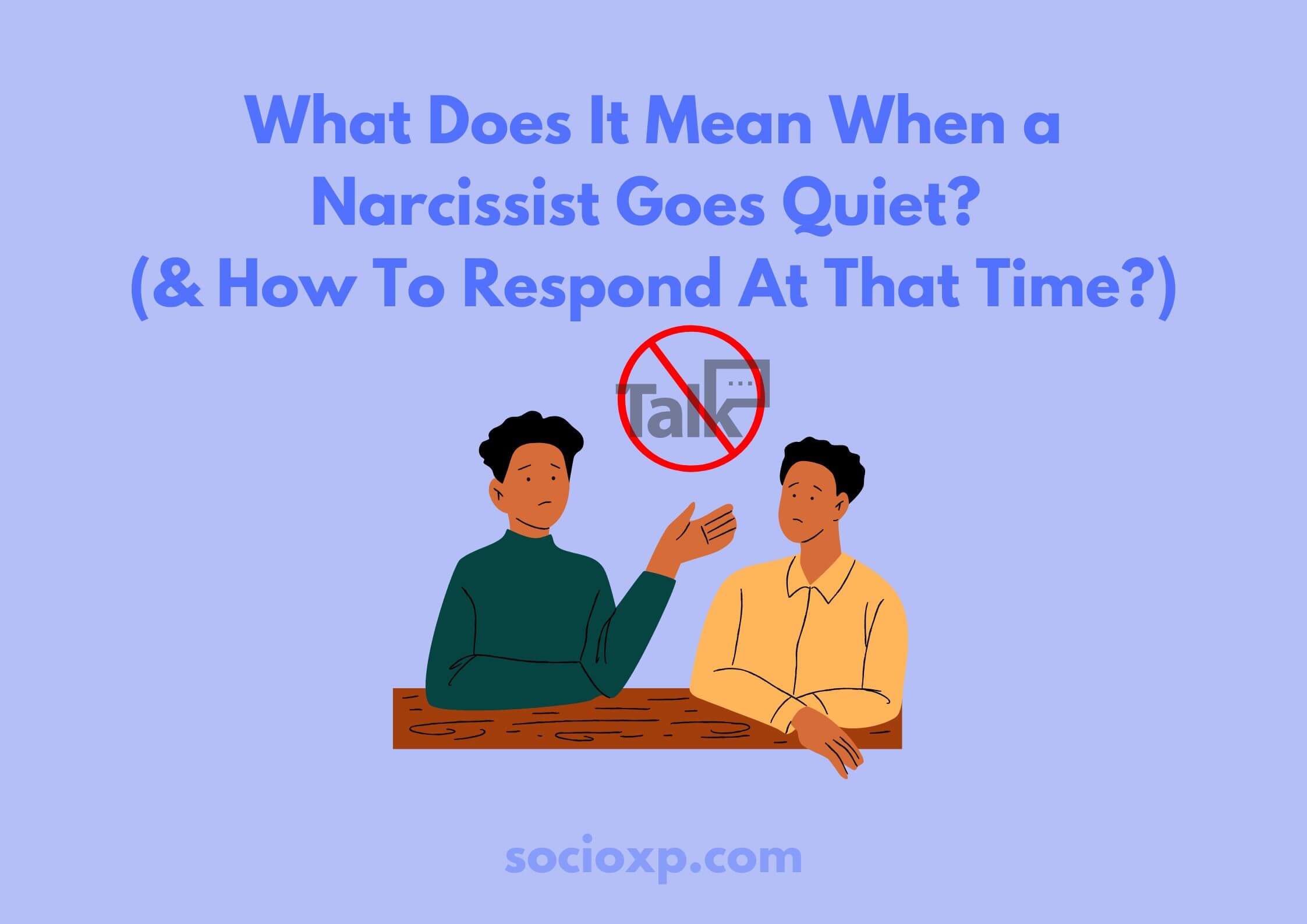Does A Narcissist Give Up Easily? (Truth Revealed)
Does a Narcissist give up easily? Narcissists always tend to put up their needs before anybody else’s and thus they work hard to achieve anything they put their mind to. If that thing enhances their image or reputation, then they may give their best try to achieve it. But if they are unable to achieve it, what is it that they do? Do they give up easily or fight for what they desire? Let us know the answer to the question, “Does a Narcissist give up easily?” further in the article.
Narcissists are driven by admiration, attention, and control. But if a narcissist feels that they might not gain anything from the pursuit then do they keep doing it? It is difficult to guess.

Does a Narcissist give up easily? The answer to this question has more than one answer based on different perspectives. Narcissists have the need to control everything, every matter, every relationship, in fact, every aspect of their life, then and only then they can function comfortably on a daily basis. When they lose control, they become uncomfortable, awkward, and aggressive as they fear that those things, people, or matters that they cannot control might expose their true abusive, fake, and manipulative selves.
Analyzing narcissists’ nature and their behavioral patterns one might easily make a preconceived notion about them not caring much about anything except themselves, but it is not so. They do care about the littlest things, details, and people who matter to them, but they just do not show or try to display it publically, as they fear that if they start showing about how much they care or understand someone or something, it might bring down their value, worth and grandeur.
Narcissists and their impulsive need to control everything
Narcissists have a strong desire to control every aspect of their life, including people in their lives or around them. They have an uncontrollable yearning to be in charge and be the dictator of how others should behave and portray their roles in the narcissist’s life. Thus this may make sense as to why a narcissist does not give up easily on anyone or anything. The need to control everything defines the character of a narcissist and their nature to not give up easily. But also this does not apply to all narcissists, as each narcissist is a different individual based on various circumstances. This obsession with control can be manifested in various ways like,
- Micromanaging – Narcissists have a tendency to micromanage everything from its root level, which includes how their partner dresses or how their colleagues or employees should work. They want to be in charge of every decision that they make, and often they do not trust anyone else’s decisions that are made for them. They get impulsive when someone else starts deciding for them. Thus their longing for micromanaging around them can sometimes backfire on them.
- Condescending attitude – Narcissists often adopt a patronizing attitude towards others especially when they want to prove themselves as someone better than others and assert their control and dominance over others. They may belittle someone else’s value or worth, devalue someone else’s opinions, neglect everybody else’s wishes and sabotage their self-esteem by degrading them.
- Rage and aggression – When things do not go as planned by the narcissist, then they can become aggressive and their rage may be uncontrollable in such conditions. They may also tend to use physical or verbal violence to intimidate others and establish their control over people and situations around them.

The Narcissistic Game of Manipulation
Narcissistic manipulation game is a strong way to keep their victims under check. It is a game that narcissists play with their victims or targets to exploit and control them. It is known as a game as it is specifically designed for one on one players; the narcissist v/s their victims who are totally unaware of the lethal and abusive game that a narcissist is going to play with them.
It is like a silent battle that the narcissist controls and you make your moves in the air without knowing and hitting the target. This game is specifically designed to make the target feel insecure and inferior and degrade their worth. They make their target dependent on them and they always need a narcissist’s approval. The tactics used by narcissists to manipulate their victims include,
- Gaslighting – This tactic involves the narcissist denying the reality of situations, events, or conversations in order to make the target question their own sanity or memory. Narcissists use this tactic to manipulate other people to the extent that others start thinking that they are losing their sanity or their minds. This technique of gaslighting allows narcissists to maintain control over the people around them by making them question their own senses and rationality.
- Love-bombing – Love Bombing is a manipulation technique commonly incorporated by narcissists to lure or engage their victims into a relationship. While love bombing seems effective in the initial stages of dating, the relationship becomes vague and blurry as it is made up of toxic pillars of shiny, sometimes false, and exaggerated affection. This tactic involves the narcissist showering the target with compliments, gifts, and affection in order to make them feel special and loved.
- Intermittent reinforcement – This strategy involves the narcissist giving the target positive intermittent reinforcement to keep them going and hooked thus making them dependent on their validation and approval.
- Triangulation – This tactic involves the narcissist pitting the target against others or involving them in conflicts in order to create drama and control the situation.
- Projection – Projections are an outcome of self-guilt and deprived self-reflection. A narcissistic person lacks both. Narcissists never feel guilt or do not have any concepts of self-reflection. Narcissists do not want their grandiose image to be tarnished by their wrongdoings. So they be blaming or point fingers at others. This is the reason narcissistic projections are more common, frequent, and intense. Narcissistic projections are like their hidden superpower according to them. They use it out of nowhere and leave you perplexed. They use these projections as a defense mechanism when they feel they would be exposed or their grandiose image is being questioned or tarnished.
- Withholding affection – This tactic involves the narcissist withdrawing affection, attention, and approval to punish the target and make them feel insecure and anxious.
- Lying – Narcissists often use lies to gain power or control over others. They may lie to get their way, to make themselves seem more important, or to make others feel inferior. They are always concerned about their image and reputation. They may lie effortlessly to conceal flaws or mistakes and appear flawless in front of others. Narcissists often have difficulty taking responsibility for their own actions or mistakes. they may lie to avoid being held responsible. They crave attention and may lie to get noticed or to be the center of attention. They may also lie to bolster their ego and feel superior to others.

Does a Narcissist give up easily? (Truth Revealed)
Narcissistic Personality Disorder is a mental health condition, where the patient has extremely high admiration for themselves, including boosted self-esteem, self-centeredness, high self-worth, boosted ego, and a low tolerance for criticism, emotions, and attachments. Narcissists are often difficult to deal with because they have an inflated sense of self-worth that permeates every aspect of their lives. They may feel entitled, arrogant, and self-centered, and their behavior can be highly unpredictable, causing chaos and dysfunction in personal and professional relationships.
Narcissistic Personality Disorder is characterized by a lack of empathy for others, a grandiose sense of self-importance, and an immoderate need for admiration. Narcissists often believe that they are entitled to special treatment, and they tend to exploit others to fulfill their needs. The disorder typically develops in early adulthood and can persist throughout a person’s life. While Narcissistic Personality Disorder (NPD) is notoriously difficult to treat, it is essential to address the disorder as early as possible to prevent those affected from inflicting emotional harm on themselves and others.
So the question still prevails, “Does a Narcissist give up easily?” – The answer to this question is both a yes and a no.
Also to determine the answer to this question, an important factor to consider is the type of narcissist. There are two types of narcissism: grandiose and vulnerable. Grandiose narcissists are more likely to persist in their pursuits, while vulnerable narcissists are more prone to giving up easily. This is because grandiose narcissists have a more inflated sense of self-importance and therefore they believe they are superior to others and are invincible. Vulnerable narcissists, on the other hand, have a more fragile self-image and can get easily discouraged by failure or rejection.

Why a narcissist would not give up easily?
Narcissists can be incredibly persistent when it comes to achieving their goals or getting what they want. They have charismatic and charming personalities that make them very good at manipulating others to get what they want. They also have an unwavering belief in their own abilities, which may give them the confidence to keep trying until they succeed.
Narcissists also have a very fragile ego. They can barely tolerate failure, rejection, or ignorance. They may give up on something that they perceive as a threat to their self-esteem. For instance, if a narcissist does not get their required admiration, recognition, validation, and attention, they may become disinterested in that particular pursuit.
Narcissists typically do not give up easily because they have a strong need for control, power, and admiration. They often have an inflated sense of self-importance and may feel entitled to special treatment or entitlement. Narcissists may resist giving up on something because it threatens their self-image and may perceive it as a sign of weakness. They may have a deep fear of abandonment or rejection, which fuels their need for control. Narcissistic behavior is complex and thus each individual narcissist and their motivations vary from person to person.

Why a narcissist would give up so easily?
Sometimes narcissists may give up easily if they do not see any immediate gratification or reward. They are not known for keeping patience and may lose interest immediately in a pursuit, project, or goal if they do not see results quickly. This can lead to a pattern of impulsiveness and short-term thinking, which can be detrimental to their long-term success.
Narcissists often give up easily because they crave constant validation and admiration from others. If their usual tactics of manipulation and control do not work, and they can not get what they want, then they may lose interest and move on to another target or victim who they believe will give them the attention and adoration that they deserve. Additionally, some narcissists have a pattern of avoiding anything that seems challenging or that might expose their true selves, weaknesses, or their double-faced personality. In these cases, narcissists choose to give up prematurely to protect their boosted sense of self-importance and thus they maintain their illusion of perfect selves by giving up easily on other people or such situations.
Inference
Does a Narcissist give up easily? – The answer to this question is not something straightforward. It lies in the grey zone with both the answers a yes and a no. Depending upon the situation and the type of narcissism, a narcissist may either persist or give up quickly. It is important to note that narcissism is a complex personality disorder, and it leaves an effect on behavior patterns and the decision-making process of a person.
Analyzing narcissists’ nature and their behavioral patterns one might easily make a preconceived notion about them not caring much about anything except themselves, but it is not so. They do care about the littlest things, details, and people who matter to them, but they just do not show or try to display it publically, as they fear that if they start showing about how much they care or understand someone or something, it might bring down their value, worth and grandeur.
- How To Make A Narcissist Discard You And Leave You Alone? - March 21, 2024
- Narcissistic Supply: 9 Signs You May Be Someone’s Narcissistic Supply - March 11, 2024
- Narcissistic Abuse And Anxiety – 11 Symptoms of Narcissistic abuse-induced anxiety - March 9, 2024


